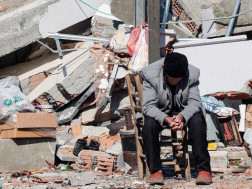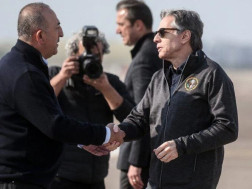BMG’s weekly review covering the key developments in Armenia, Azerbaijan and Turkey over the past week will focus on Turkey, shaken by the deadliest earthquake.
Life for millions across Turkey and Syria changed forever on Monday, Feb. 6, as two consecutive earthquakes with magnitudes of 7.8 and 7.5 caused widespread damage and tens of thousands of fatalities. It was the deadliest and strongest earthquake in Turkey since the 1939 Erzincan earthquake and also the deadliest earthquake to have affected Syria since the 1822 Aleppo earthquake.
At the time of writing, the death toll from the earthquakes in Turkey and northwestern Syria has gone past 29,000 as rescue efforts continue. The number of deaths in Turkey rose to 24,617 while more than 4,500 were killed in Syria.
The World Health Organization put the number of people affected by the disaster at 23 million.
In Turkey, thousands of buildings, including homes and hospitals, roads, pipelines and other infrastructure, have sustained heavy damage in the area, where some 13.4 million people used to live.
Earthquake Diplomacy
Countries around the world, including Ukraine, which is battling against a Russian invasion were rushing to send rescue workers, equipment and aid to quake-hit Turkey and Syria. No one get surprised hearing that for example, Georgia, Azerbaijan, the EU members, the USA or the UAE were quick in response to international assistance, however there were countries that made a surprising move.
Armenia was one of this country. Yesterday, Armenia has sent humanitarian aid to Turkey. Trucks with humanitarian aid have crossed the Margara bridge on the border and are on their way to the earthquake-stricken region.
The border was crossed for the first time since 1993. Earlier, Armenia sent search and rescue teams to quake-stricken areas in Turkey and Syria.
Armenia and Turkey have no diplomatic ties. Turkey shut down their common border in 1993, in a show of solidarity with Azerbaijan, which was locked in a conflict with Armenia over the Nagorno-Karabakh region.
Turkey also refuses to recognize the Armenian genocide, committed during 1915-1923 when an estimated 1.5 million Armenians were massacred by the Ottoman government. The overwhelming majority of historians widely view the event as genocide.
In 2020, Turkey strongly backed Azerbaijan in the six-week conflict with Armenia over Nagorno-Karabakh, which ended with a Russia-brokered peace deal that saw Azerbaijan gain control of a significant part of Nagorno-Karabakh, local media ARKA reports.
Another country delivering its assistance to Turkey despite uneasy relations, was Greece.
Greek foreign minister Nikos Dendias visited the earthquake-stricken areas of Turkey Sunday, accompanied by his Turkish counterpart, Mevlut Cavusoglu.
The visit was part of a new round of so-called “earthquake diplomacy” between the two uneasy allies, whose relations have often been frosty, if not downright hostile. Something similar happened in 1999, three years after the two countries almost went to war over two uninhabited islets in the Aegean Sea.
In August 1999, a 7.6 magnitude tremor had struck Turkey, resulting in about 18,000 dead; the following month, a 6.0-magnitude earthquake struck the Greek, capital, Athens, killing 143 people. In both cases, the two countries sent rescuers to assist in each other's efforts. The warming of bilateral relations had been widely covered in the international media.
Cavusoglu recalled a letter that he, as a private citizen, had sent to TIME magazine at the time.
“Back then, I said that we should not wait for another earthquake to improve our relations. I repeat this now, as Turkey's foreign minister. We must make efforts to improve our relations,” Cavusoglu said.
“I want to totally sign on to what Mevlut said: that we should not wait for natural disasters to improve our relations,” Dendias said later.
The two countries are at odds over research for natural resources in the Aegean and the Eastern Mediterranean. Turkey has also accused Greece of militarizing some Aegean islands, in violation of international treaties, a charge Greece has strongly denied. Turkish President Recep Tayyip Erdogan has often threatened Greece that Tukish troops will come "suddenly one night,” and has mentioned that Turkey's new Tayfun missiles can reach Athens.
Such rhetoric has, at least for the moment, been put aside. Erdogan has spoken on the phone with Greece's President Katerina Sakellaropoulou and Prime Minister Kyriakos Mitsotakis, with whom he had had declared he would not speak ever again. The two Greek officials called Erdogan to express their condolences for the earthquake's victims and assure him of Greek support, ABC News reports.
Economic damage
This is first and foremost a human tragedy, however there is also economic loss, that needs to be counted.
Fitch Ratings commented on insurance losses from Turkey-Syria Earthquake, according to which "insurable losses are hard to estimate as the situation is evolving, but they appear likely to exceed USD2 billion and could reach USD4 billion or more. However, insured losses could be much lower, perhaps around USD1 billion, due to low insurance coverage in the affected regions.”
According to Turkish officials and economists, earthquake will add billions of dollars of spending to Ankara's budget and cut economic growth by up 2 percentage points this year, Daily Sabah reports.
While officials say the extent of the destruction is not yet clear, they believe rebuilding will stretch Turkey's budget.
"There will be billions of dollars of damage," one senior official told Reuters, adding there would need to be a rapid reconstruction of infrastructure, houses and factories.
Three economists calculated GDP growth could drop 0.6 to 2 percentage points under a scenario where production in the region drops 50%, which they said would take six to 12 months to recover.
The government is foreseeing a 5% growth in 2023.
Separately, a senior official said growth could be 1 or 2 percentage points below the targeted 5%.
"Some of the investment resources foreseen in the budget will need to be used for these areas," the official said.
The southeast region hit by the earthquake accounts for 8.5% of Turkey’s exports and 6.7% of imports. But economists say the earthquakes are unlikely to affect Turkey’s trade balance as both exports and imports are expected to drop.
Building Safety
The fact that even some of the newest apartment blocks crumbled to dust in Turkey has led to urgent questions about building safety standards.
Modern construction techniques should mean buildings can withstand quakes of this magnitude. And regulations following previous disasters in the country were supposed to ensure these protections were built in.
The government has vowed to investigate thoroughly anyone suspected of responsibility for the collapse of buildings.
Later on Feb. 12, Turkish authorities have detained or issued arrest warrants for 130 people allegedly involved in constructing buildings that toppled down and crushed their occupants.
Upcoming elections
Opposition politicians are openly blaming Turkish President Recep Tayyip Erdoğan for the fact the country was ill-prepared for the catastrophe, as well as for the slow relief effort which they say has been worsened by the state’s failure to cooperate and coordinate with local authorities and relief agencies.
The anger is mounting as the Turkish president faces elections in three months’ time, in what is likely to be the closest-fought contest in Erdoğan’s 20-year rule.
Erdoğan’s handling of this humanitarian crisis could affect the election results. The failed response of the then government to the huge earthquake in northwest Turkey in 1999 was widely seen as having given Erdoğan’s AKP party the opportunity to gain popular support.
A Turkish official told Reuters on Thursday that authorities could consider postponing this year’s election, because of the earthquakes.
“It seems like we have come out of the election period that we were entering. We will look at the developments, but right now there are serious difficulties in holding an election on May 14,” the official said. Some opposition politicians believe the polls will go ahead, even if they’re ultimately delayed.
Critics say Turkey’s national funds meant for natural disasters were instead spent on highway construction projects managed by the government’s associates. In many areas the buildings that collapsed were built in early 2010 or as recently as the last couple of years and should normally have complied with earthquake regulations in force after the 1999 disaster.
















